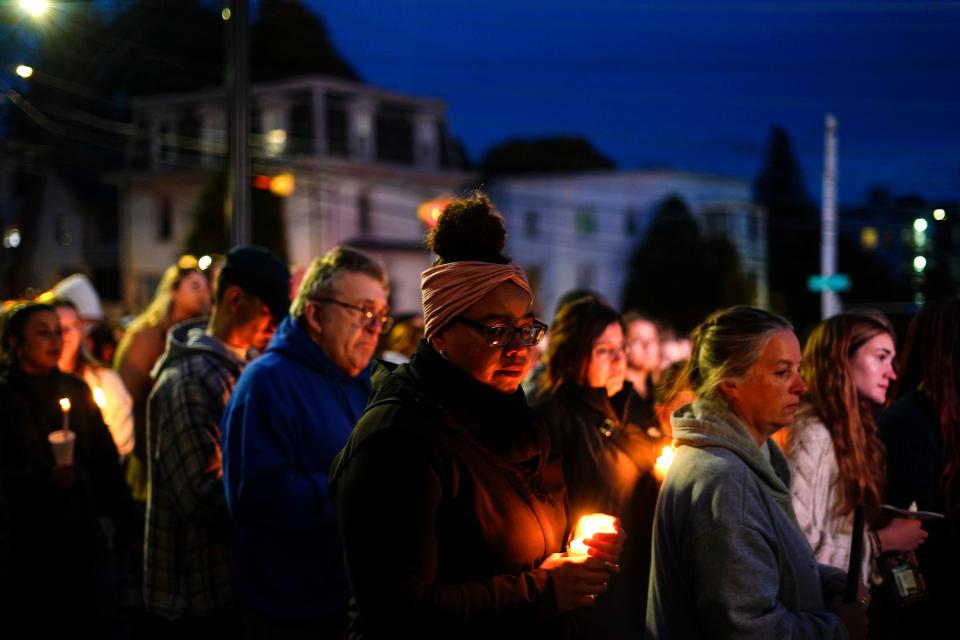Remember Maine, Gov. Hobbs. Arizona needs a red-flag law
- Oops!Something went wrong.Please try again later.
- Oops!Something went wrong.Please try again later.
It’s now been one week since the latest American horror story.
That is, if you don’t count the 14 mass shootings since then in which 17 people were killed in North Carolina, Ohio, Texas, Maryland, New Mexico, Kansas, Indiana and Florida.
One week since an Army reservist who was hospitalized in July after “hearing voices” and threatening to shoot up a military base grabbed his trusty rifle and instead shot up a bowling alley and restaurant in Lewiston, Maine.
Eighteen people died and another 13 were injured in Maine’s deadliest-ever shooting.
Could it have been prevented?
Might a red-flag law have allowed the police to remove Robert Card’s weapons, including the high-powered Ruger SFAR he legally bought just 10 days before he was hospitalized?
Ducey failed to pass a red-flag law
Only God knows but as the old saying goes, God helps those who help themselves.
And in Arizona, we are apparently helpless.
Where is the call to create a red-flag law in our state? To give family and police and others at least a fighting chance to temporarily take away guns from people who pose a danger to themselves or others?
Currently, it takes an involuntary commitment to a mental hospital to seize a person’s guns.
Republican Gov. Doug Ducey proposed a red-flag law in 2018, after the Marjory Stoneman Douglas High School massacre in Parkland, Fla. (17 dead/17 injured). Both Republican and Democratic lawmakers opposed it (one side thought it was too strict, the other too loose).
Ducey tried again in 2019 after the El Paso Walmart massacre (23 dead/23 injured). That bill, too, went nowhere.
By 2022 — after Buffalo, N.Y. (10 killed, three wounded) and Uvalde, Texas (21 dead, including 19 children) — Ducey had quit trying.
So far, Hobbs simply has vetoed bills
Meanwhile, Democratic Gov. Katie Hobbs hasn’t even begun trying.
April brought us six dead innocents inside a Nashville elementary school. In response, Tennessee Gov. Bill Lee, a Republican, signed an executive order aimed at strengthening state background checks for gun purchases and he called on his state’s Republican-run Legislature to pass a red flag law.
“A new, strong order of protection law will provide the broader population cover, safety, from those who are a danger to themselves or the population,” he said at the time.
Old enough to remember: When mass shootings shocked us
Sadly, not even the deaths of three children, a teacher, a principal and a custodian were enough to overcome the power of the gun rights lobby in Tennessee.
Or in Arizona.
This year, our leaders were busy passing their own version of gun “reforms” — including bills that would remove silencers from a state list of prohibited weapons, allow parents to bring guns into schools and punish banks that don’t want to do business with the firearms industry.
Hobbs vetoed all three.
It's time to play offense, governor

Now, with an election on the horizon, it’s time to play offense. Gov. Hobbs should follow Gov. Ducey’s and Gov. Lee’s lead and propose a red flag law, along with a companion bill to require universal background checks.
Twenty-one states have “extreme risk laws,” as red flag laws are called.Maine, a state controlled by Democrats, is not among them.
That state’s Congress considered it in 2019 but instead passed a weaker yellow-flag law negotiated by Democratic Gov. Janet Mills and the gun rights lobby.
Unlike a red flag law, only the police can initiate a yellow flag petition. And it requires several extra steps to seize someone’s guns — steps that allow more due process for the gun owner but take time that a person experiencing a mental health crisis may not have.
It’s unclear whether the police in Maine tried to yellow flag Card.
But the warning signs were certainly there.
Our leaders should ask these questions
A member of Card’s family told NBC News that he’d been hearing voices for months and that the family contacted both the police and his Army Reserve unit as they “got increasingly concerned.”
On July 16, while training in New York, he was taken by state police to a military hospital after his commanders became concerned about his “erratic behavior”. He was released two weeks later. The Times Union, in Albany, reports the police didn’t seek an emergency risk protection order under New York’s red flag law.
The Associated Press reports that the Army Reserve tipped off the sheriff in Card’s home county in Maine. A deputy was dispatched to check on Card but he wasn’t home, prompting the sheriff to issue a statewide alert, asking police to be on the lookout.
That was in mid September.
On Oct. 25, Card opened fire inside a bowling alley and then a restaurant in Lewiston, killing 18 people and injuring another 13. Two days later, he was found dead, having killed himself.
Might a red flag law have saved those 18 people, along with the man who killed them?
Might it save the next set of sitting ducks who are out there in our schools and our movie theaters and our shopping centers and now, in our bowling alleys and restaurants?
Might it be a question that our leaders ought to at least be asking?
Reach Roberts at laurie.roberts@arizonarepublic.com. Follow her on X (formerly Twitter) at @LaurieRoberts.
Support local journalism: Subscribe to azcentral.com today.
This article originally appeared on Arizona Republic: Red flag law might have spared Maine. Arizona needs one, too

